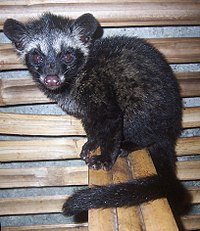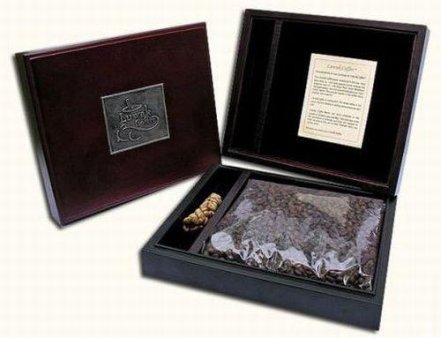 Kopi luwak (Indonesian [ˈkopi ˈlu.ak]), or civet coffee, is coffee made from the beans of coffee berries which have been eaten by the Asian Palm Civet (Paradoxurus hermaphroditus) and other related civets, then passed through its digestive tract.A civet eats the berries for their fleshy pulp. In its stomach, proteolytic enzymes seep into the beans, making shorter peptides and more free amino acids. Passing through a civet's intestines the beans are then defecated, having kept their shape. After gathering, thorough washing, sun drying, light roasting and brewing, these beans yield an aromatic coffee with much less bitterness, widely noted as the most expensive coffee in the world.
Kopi luwak (Indonesian [ˈkopi ˈlu.ak]), or civet coffee, is coffee made from the beans of coffee berries which have been eaten by the Asian Palm Civet (Paradoxurus hermaphroditus) and other related civets, then passed through its digestive tract.A civet eats the berries for their fleshy pulp. In its stomach, proteolytic enzymes seep into the beans, making shorter peptides and more free amino acids. Passing through a civet's intestines the beans are then defecated, having kept their shape. After gathering, thorough washing, sun drying, light roasting and brewing, these beans yield an aromatic coffee with much less bitterness, widely noted as the most expensive coffee in the world.Kopi luwak is produced mainly on the islands of Sumatra, Java, Bali and Sulawesi in the Indonesian Archipelago, and also in the Philippines (where the product is called motit coffee in the Cordillera and kape alamid in Tagalog areas) and also in East Timor (where it is called kafé-laku). Weasel coffee is a loose English translation of its name cà phê Chồn in Vietnam, where popular, chemically simulated versions are also produced.
These little mammals Palm Civet (Paradoxurus hermaphroditus) live in the trees and one of their favorite foods is the red, ripe coffee cherry. They eat the cherries, bean and all. While the bean is in the little guy's stomach, it undergoes chemical treatments and fermentations. The bean finishes its journey through the digestive system, and exits. The still-intact beans are collected from the forest floor, and are cleaned, then roasted and ground just like any other coffee.
 Young Asian palm civet (Paradoxurus hermaphroditus)
Young Asian palm civet (Paradoxurus hermaphroditus)The resulting coffee is said to be like no other. It has a rich, heavy flavour with hints of caramel or chocolate. Other terms used to describe it are earthy, musty and exotic. The body is almost syrupy and it's very smooth.
One must wonder about the circumstances that brought about the first cup of Kopi Luwak coffee. Who would think to (or even want to) collect and roast beans out of animal feces? Perhaps a native figured it was easier to collect the beans from the ground this way, rather than having to work harder and pick them from the trees? We'll likely never know. But because of the strange method of collecting, there isn't much Kopi Luwak produced in the world. The average total annual production is only around 500 pounds of beans.
 Sumatran kopi luwak farmer shows beans prior to cleaning and roasting,
Sumatran kopi luwak farmer shows beans prior to cleaning and roasting,Sumatra, Indonesia

The most expensive coffee in the world does not hail from Jamaica or Hawaii, but instead from Indonesia.

Indonesian Luwak Coffee
Because of the rarity of this coffee, the price is quite outrageous. If you can find a vendor, the current cost for a pound of Kopi Luwak is around $300 or more. Some more adventurous coffee houses are selling it by the cup, but you won't likely find it at your local coffee shop just yet. The coffee isn't so spectacular that it's truly worth that amount of money. You are paying for the experience of enjoying such an unusual and rare delicacy.
sumber: most-expensive.net, Google, indonesianPortal

